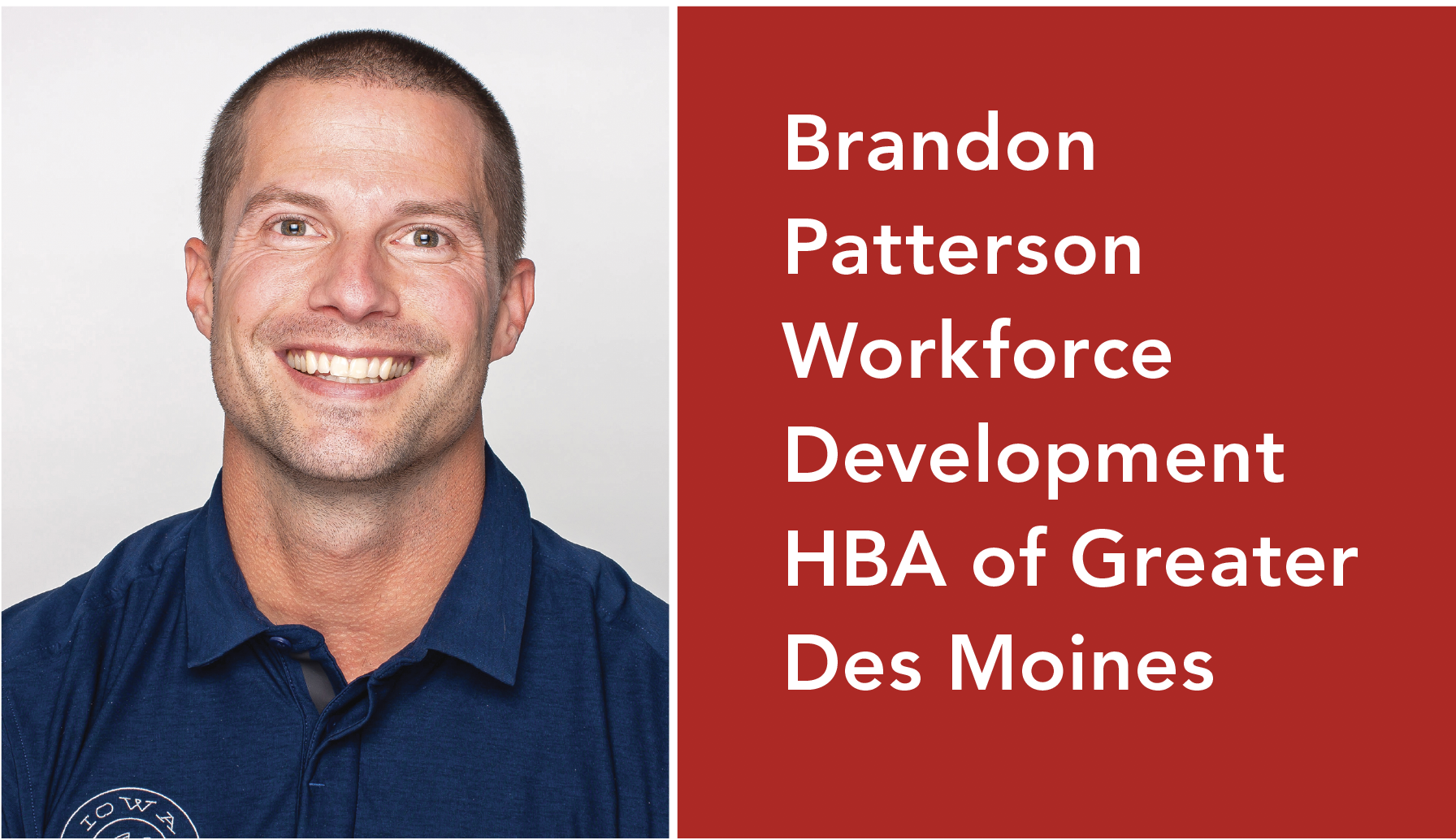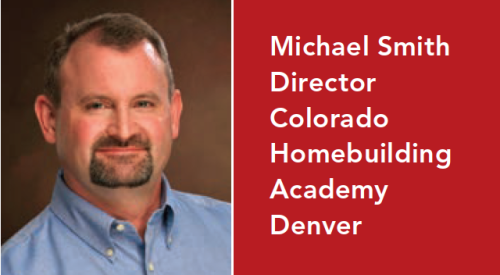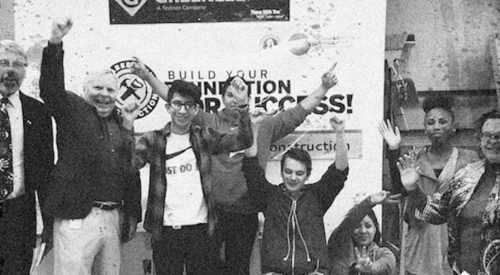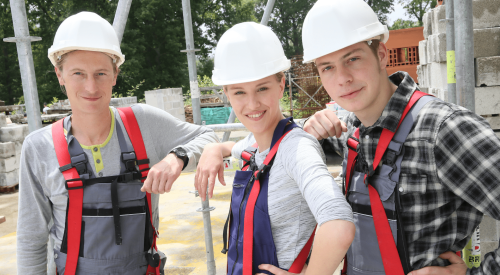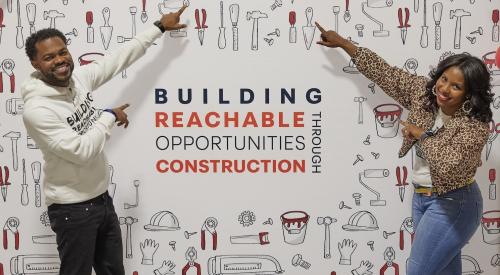Brandon Patterson is among the founders of the Alliance for the Skilled Trades, a group of industry leaders, businesses, and educators that helped raise $2 million to launch the Skilled Trades Academy, a regional pre-apprenticeship skills and training program serving high school students at the Central Campus of Des Moines (Iowa) Public Schools.
Sensing the need to increase awareness about career opportunities available in the construction trades, he and fellow volunteers also poured over 1,000 hours into staging “An Evening to Bring the Significance Back to the Trades.” The September 2017 event attracted more than 1,600 attendees and former Dirty Jobs TV host Mike Rowe. The evening also raised money to fund scholarships, academy programs, and the Build My Future tour, hands-on events in four cities last spring that enabled 3,000 sixth through 12th graders to use tools and learn about careers in the trades.
Q: How did you come up with the vision to create an event that attracted 1,600 attendees and TV personality Mike Rowe?
A: We raised $2 million for our Skilled Trades Academy to be able to open in 2017. We were super excited about it, but some people were saying the academy was the world’s best kept secret, which is not the way you want any program to be, particularly when you have this huge skills gap. So we had to do something that was going to make a big impact across Iowa.
Our goal was to start a coalition between unions, vendors, and suppliers, and the Department of Education in Iowa, which continues to be a huge partner with us, and Future Ready Iowa, which is a workforce program. We just wanted to collaborate with these people and put on this huge event where we bring in somebody like Mike Rowe along with educators and students. [Teachers and students] were allowed to go to this event for free. If they had to pay for tickets—$150 per seat—it would have cost something like $50,000. We gave that away so they could come.
It was a way to get them not just to understand what is going on here in Des Moines but to learn about the great programs in the Iowa City/Cedar Rapids area where they do the student-built house every year, and they have a great program with Kirkwood Community College.
Iowa Skilled Trades was started as an initiative to have a consistent message telling everybody what's going on across the state. That’s why we did four Build My Future hands-on immersive events last spring together. It's just a way where we continue to battle this workforce skilled-trade problem. That’s how it started.
I came up with this random idea in my basement, but then we had to have somebody believe we could come through and do this because Mike Rowe is not cheap. The venue was expensive, and then trying to get over 1,600 people there and pay for the event ... we just knew it was going to be a lot of work.
It started back in December 2016, and we didn’t have a signed contract from Mike Rowe until July 2017. We had verbal commitments from February but just working through that contract and the financing was a lot of work. We had to have somebody believe in us, and luckily our state home builders association and our local HBA in Des Moines believed in what we can do. There were basically three of us who put that on.
College is not the answer for everyone. Tradespeople are going to earn way more money coming out of their apprenticeships than graduates coming out of college. But the stigma is still there ... and that's something we are battling.
Q: When you approached vendors and others for help, what was the reaction?
A: I think they all saw the need for it. We did have some people say, “Mike Rowe? Yeah, right.” Other people said, “Good luck.” Some asked for the contract—we had a micro contract at the time—to see if this was real. Then we had plenty of people who didn't see [the potential], so reactions ranged across the spectrum. It wasn’t until after that event that many people realized how big it was, even though we’d been telling them for six months that we’re going to fill up this space with 1,600 people, the governor is going to be there, the media will be there.
We had such a good reaction after that. We not only received donations to our Skilled Trades Academy in Des Moines but also for Waterloo/Cedar Falls in northern Iowa. [The donations] actually expedited their workforce development program, which originally was going to open in 2020. They built the school there, which is a collaboration between area high schools and a community college, and opened in 2018. Even some of our contributors that gave us $5,000 or $10,000 said, "Sure, OK, we’ll put our name [or brand] on it." ... For the most part, it came through the way we envisioned it, and they started to believe in it.
Q: Are you able to get unions and contractors to collaborate on developing the academy’s curriculum?
A: We are three years in and still collaborating on curriculum. The curriculum needs to be evolving because our goal is to have it universally accepted once the student gets out. If they decide to go straight into an apprenticeship or to college, we want there to be the expectation that they will get [college] credit or apprenticeship hours.
It’s a lot harder to get things accepted across all of these different lines, whether it’s union, nonunion, or whatever. All those groups are different. We currently work with the HBI curriculum, and we work with NCCER [National Center for Construction Education & Research], which this fall will be initiated [at the academy] as a core program through our intro program. We already have the welding school, which is the longest running program on the campus, I believe, so we added them into our Skilled Trades Academy.
We run those three programs, and we are also working on getting some of the curriculum accepted by the unions because there are some unions that will allow reciprocity. There are ways we can have that union program be accepted so these kids who are doing NCCER, HBI, welding, and whatever the union piece is, will all be accepted, so that student can walk in to an apprenticeship program with months taken off their apprenticeship time.
Q: What are the barriers to setting up apprenticeships?
A: It’s always interesting to deal with all the different personalities and groups. We’re all going after the same people, which is why our coalition kind of works because what we’re trying to do and say is give students an opportunity and let them make the choice after that. We just want to get them interested in the trades and from there do an apprenticeship. If that’s on the union side, great. A lot of unions train people, and they may end up coming out of the union five years or 10 years later and open their own shop, or maybe they go into a nonunion shop. The unions have great curricula and great training, so it’s not for us to make that choice for the students. It’s up to them. You have to work around different personalities and egos, but that happens everywhere.
I think we’re lucky in Des Moines. We’re all working well together and working for the same things. As far as the curriculum and education goes, I wish there was more of a universal program out there. It would be awesome if somehow—and I don’t know if this could ever happen—NCCER, HBI, and all of those groups would just get together and create a program or at least say: Hey, you took NCCER, let’s make that apply maybe not to the whole HBI curriculum but satisfy part of it.
I wish we could do that. We’re tying to figure out a way where it is expected. It would take a lot of work to figure out like when you come into a program after leaving a different program, but I think that would be beneficial, especially if a student moved from one state to another or if one program is accepted over another.
Q: That’s a great overarching goal, but it sounds like it requires a lot of logistics. Would you need the Department of Labor to get involved? Who could spearhead an effort to unify those curricula?
A: It is a lot of logistics, but people will have to get over themselves. Definitely Department of Labor would have to be involved in those meetings as far as [determining] what we have to do and how we make it work. Probably local and state workforce development programs would have to be involved, too, as they have the dollars for those programs.
Q: Are you hearing or seeing any momentum towards that goal?
A: I’m actually forming a group now with people across the country who I consider doers and thought leaders in the workforce development, construction, and skilled trades arena. So I have Lowes’ Generation T, Craig Tools, SkillsUSA, NCCER. So we do talk on a monthly basis about how we can help each other out, what is everybody seeing, how do we make these programs work together.
Q: Are contractors getting better at telling you here’s what we need students to learn so they’re work ready? What are the competencies that builders/contractors want?
A: The curriculum is always evolving, and it has to apply to real life. The biggest thing we are finding—in addition to knowing how to use the tools in the field—is knowing math, construction math; math that is real and that you would use every day. Unfortunately, for many people who have been in schools for the last couple of years, it's not a common core class. [The need for ] math proficiency is something we hear about from the people who have graduated and the people who hired those graduates. It's something we have known, and we need to figure out how to create a better construction math program. You won’t always have your phone or construction calculator there to do your calculations, so you have to know how to do them on the fly, especially if you're a roofing or drywall estimator. You really need to know your angles and all that stuff. Knowing math is the No. 1 thing we hear.
Q: What reaction do you get when you recruit at schools?
A: You still get a mix of reactions. The ones who have a bad reaction to it are the people who are older than I am [38]; those taught to go to college by their parents and guidance counselors. Now they are working in the schools and still living by that message. But that message doesn’t make sense any more. College is not the answer for everyone. Tradespeople are going to earn way more money coming out of their apprenticeships than graduates coming out of college. But the stigma is still there [that an education in the trades is somehow second-rate], and that's something we are battling. We’re trying to fix that narrative. In fact, that's something that Generation T is really good at: getting people to understand what's available to them.
Sure there are some bad jobs in the trades, but the best thing about them is the ability to work up the ladder and possibly someday start your own company. Experience means something, kind of like a when a college degree used to mean something. If you have six years' experience in the construction industry and you’re a good employee, chances are you’re going to continue moving up. The sky is the limit.
The curriculum is always evolving, and it has to apply to real life. The biggest thing we are finding—in addition to knowing how to use the tools in the field—is knowing math, construction math; math that is real and that you would use every day.
We just made a career readiness packet that will be going out to all the guidance counselors in Iowa Workforce Development, and there's other stuff we've been working on for the last six months with the Iowa Department of Education that shows experience is more important than school. We’re actually looking forward to sharing that because people need to understand that opportunities are there.
It is a mixed reaction. For our Build My Future thing, if you took their reactions, most people were loving their opportunities in the trades. If you can show them the opportunities available to them, they’d probably be pretty amazed.
For Build My Future, we did four events across the state of Iowa last spring and hit about 3,000 students with that hands-on immersive event (check out the video, below) where they got to run mini excavators and do welding, roofing, and all that stuff. Most of the kids had never had these opportunities before. Those types of events help grow the Skilled Trades Academy on Central Campus and the Hawkeye Community College program. It's a hands-on career fair. We just show those students where the programs and opportunities are around their area.
Q: Do you find the sentiment among educators is that a career path in the trades is less desirable than going to college?
A: That happens. Schools meet with us and we talk with the students, but then I wonder if what schools say to students after we leave is different. We do hear that, even after our hands-on event. Parents were mad that their kid didn’t get invited to Build My Future. We tell them we invited everybody, and then they come to find out that the guidance counselor isn’t inviting all of the kids because maybe they were on the college path. That’s pretty unfortunate.
That’s going to continue to happen until we change that college/trades perception. I think we are in the beginning of this. We could be five or 10 years away from that shift because it takes that long to build grass roots. When some of those teachers and guidance counselors finally retire and a new batch comes in who truly understand how bad college debt is and that college isn’t for every kid and there are other programs out there, then things will change more quickly. Really, I think the college model will probably change in the next 10 or 20 years. Why does someone who is going into architecture or construction have to know English literature or the history of Western Europe? Why do they have to take these general education classes when really you should be learning what your industry is going to be. Right now, it’s a broken system.
Q: How will Skilled Trades measure success?
A: Currently, we can use enrolment. Our enrolment has increased to almost 400 for 2019/20. That’s an increase of almost 100%. The goal would be to get legitimate metrics where we track our students, know where they end up, and what field they're in.
The $2 million we raised is all private donations from our industry. HBI, along with the largest home builders in town, tool manufacturers, and suppliers donated money. So our industry wants to know that the money they're giving is getting used and they want to know where our kids are going. We’re working on our metrics and how we can track our students. It’s another thing with the Skilled Trades Academy that is still evolving. How many kids go on to a two-year trade program and how many leave the trades altogether. That's something we should know.
Also, we need to figure out a sustainable funding model because we can’t keep asking our industry to fund the school. It worked up-front to kickstart the program, but we need to find a sustainable model. We're working with five of our local municipalities to put in a fee for a building permit, whether it’s installing a fence or a basement remodel, or new single-family, multifamily, or commercial work. We went through the nation and found similar programs, and so we’re trying to do our own. We want to do a three-to-five-year roll-out to test it. If it works, hopefully we can roll it out to the rest of the metro area. It’s an opt-in; if you build a single-family home it’s $100, if you’re building commercial space, it’s based on square footage.
There are programs doing this across the nation, and it seems to be working well. You can also roll this into scholarships. It’s a way to allow the program to grow without it continuing to ask people for money. Two million dollars is a lot of money. We also got a $150,000 grant for our phase two build-out that's going to be between $600,000 and $800,000 to open more classrooms for the Skilled Trades Academy. You can’t keep going back to the pool and asking for more money, so we're working on building sustainable models.
The need is there. We realize that … We aren't funded by Des Moines public schools. We pay for the teachers, the curriculum, and all of this stuff. DM PS has a $26 million deficit each year over the next three years; they can’t even afford us, so we have to fund this thing.
Other communities with programs aren’t getting the spotlight like they should, so hopefully we can help them get the word out because there are amazing programs out there. Northwest Iowa has a $3 million to $8 million program that's all self-funded. And there are some good manufacturer programs, too. Pella works with high schools in Pella, [Iowa], so does Iowa industrial and farm equipment manufacturer Vermeer. Programs where Pella high school students are working at those factories during the summer … during school and they can roll right out and get a job. They can come out making $50K to $70K a year.
This is a longer version of the article that appeared in the October issue of Professional Builder.
